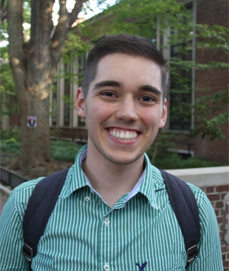Phillip Trent
 Why CMPE at Penn?
Why CMPE at Penn?
I fell in love with computers while working IT for my high school. Through that I realized that I couldn’t see myself in a life where I wasn’t exploring the fascinating, ubiquitous machines that enable humans to perform some of the most amazing feats in history. That’s why “computers” but the question is “why CMPE?” I looked long and hard at both electrical engineering and computer science trying to fit myself into one of the two bins—was I a computer scientist or an electrical engineer? What did I want to learn? Answering this question was probably one of the most difficult choices that I have made thus far, and I question it constantly. To me, computer science and electrical engineering are each a single side of a two-sided coin. There’s a yin-yang, ebb-and-flow quality to the two fields that I believe is best combined in computer engineering. I satiate my desire for circuit theory, digital design, and true hardware knowledge without distancing myself from the expansive, powerfully creative, theoretical and practical benefits of software. I was looking for a program that completely encompassed the computer, and I found it at Penn in the CMPE program.
What would you say is your favorite CMPE class?
This is a terribly difficult question (and I’m sure the answer will change), but the course that really pushed me—sometimes to the breaking point—as a computer engineer was ESE 350, which is the embedded systems course. CMPE is centered around the coupling of hardware and software, so embedded systems is a natural fit for the degree, and this class all the more because of the (terribly notorious) final project. Not for the faint of heart, the final project is honestly you and your lab partner against time, resources, and ever-mounting failures trying to build something incredible. Sometimes—as was the case with my team’s project—you’re building something that has really never been tried or tested before. It’s my favorite because it has all of the things that I look for in a class: I built something (though this is a very common occurrence in the CMPE degree), I was challenged, I got to solve a real problem, and I was able to use the breadth of knowledge from my past coursework to really create.
How would you describe the CMPE to friends or family who aren’t familiar with it?
The people are a family; the degree is difficult; and “I do hardware AND software.”
What do you think it takes to be a “successful” computer engineer?
I put a lot of weight on the word “success” because I think it is very often misused. To me, pursuing monetary gain or fame is not true success. Being a successful computer engineer is just like being a successful human being—it’s about looking back and being proud of what you’ve accomplished and satisfied with where you are. I think if you’re a person considering computer engineering, then you need to be passionate about it, and you need to realize that it’s not for everyone. The degree has very little flexibility, and you’ll start to realize that the working world tries to push you into one of those bins I was talking about earlier, so it’s hard to stay a computer engineer. To be a successful computer engineer is to be naturally passionate about the field, and to be a successful person is to realize that doing what you’re passionate about is the root of lifelong success.
What internships have you done? (Or for seniors, what are you doing next year?)
After freshmen year, I worked remotely for a startup in iOS UI/UX Design, and iOS software development. After sophomore year, I worked at Xilinx on the CMAC/Interlaken COE Team helping them automate the testing for new pre-production FPGAs and SoCs. Both summers have offered very unique perspectives on the private sector and the sheer breadth of available fields.
What other activities do you participate in at Penn?
I’m on the leadership team for Penn Faith & Action, which is an on-campus Christian organization and a pretty great family of friends. I also help out with Architechs—Penn’s hardware hacking group—when they need a helping hand. This semester, I am studying abroad at ETH Zürich, which has been an absolutely unforgettable, incredible, life-altering experience like nothing I could have imagined.
